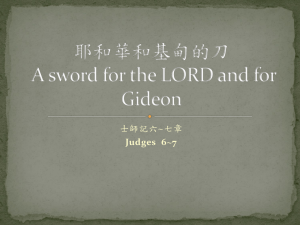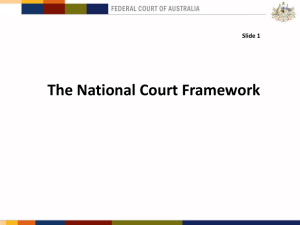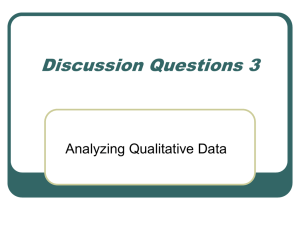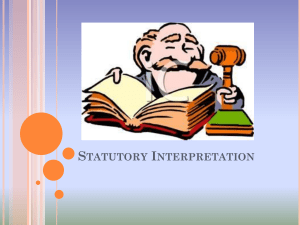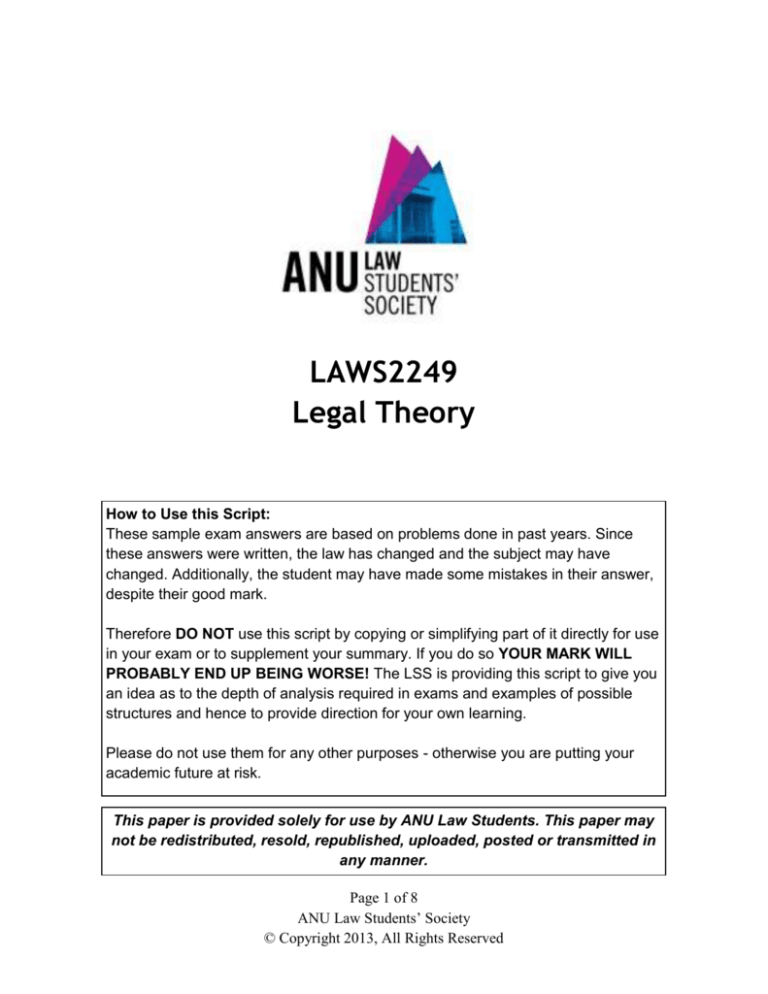
LAWS2249
Legal Theory
How to Use this Script:
These sample exam answers are based on problems done in past years. Since
these answers were written, the law has changed and the subject may have
changed. Additionally, the student may have made some mistakes in their answer,
despite their good mark.
Therefore DO NOT use this script by copying or simplifying part of it directly for use
in your exam or to supplement your summary. If you do so YOUR MARK WILL
PROBABLY END UP BEING WORSE! The LSS is providing this script to give you
an idea as to the depth of analysis required in exams and examples of possible
structures and hence to provide direction for your own learning.
Please do not use them for any other purposes - otherwise you are putting your
academic future at risk.
This paper is provided solely for use by ANU Law Students. This paper may
not be redistributed, resold, republished, uploaded, posted or transmitted in
any manner.
Page 1 of 8
ANU Law Students’ Society
© Copyright 2013, All Rights Reserved
Semester 2 2012Legal theory – semester 2, 2012
Question 1A – 75% (markers comments in red)
1. Introduction
This essay will argue that the state of Marxistan does not have the Rule of Law (RoL). Using
Fuller’s desiderata as a definition of the RoL, it is clear that Marxistans’s legal system lack
clarity [underlined by marker] and laws that are applied equally to all. However, this essay will
also argue that rather than displaing the customary rules that threaten the RoL, Marxistan should
accept a plural legal system, with some modifications, as pluralism comes with many benefits,
and in the case of Marxistan, seems to have created a stable system. [✓]
2. Does Marxistan have the RoL?
A) Definition of the RoL
Fuller holds a formal conception of the RoL which states that to have the RoL, a society must
have rules that are clear, general, not retrospective, followed by the officials of the system,
consistent with each other, known to all, relatively constant over time, and which demand only
what is possible. Raz adds to this definition that the RoL is applied equally to all. Manderson
points out that absolute equality under the law is not required, but no laws can be applied to only
one group reasons not related to the voluntary choices of that group, because this would be
arbitrary.
It is clear that the legal system of Marxistan fails these tests as the same rules are not applied to
everyone on an equal basis [the marker circled ‘Manderson’ and drew an arrow to here with a
question mark], there is a lack of clarity and the rules are not known to all.
B) Applied Equally to All
The laws in Marxistan are not applied equally to all because different laws apply to different
people case on the arbitrary [underlined by marker] condition of where they live; traditional law
applies to those living in rural areas, and governmental applies to those living in urban areas. It is
not clear that citizens may choose between the systems and this is hence arbitrary. [underlined by
marker]
C) Clarity
The Marxistan legal system lacks clarity because of the plurality of the legal system. Tamanaha
points out that plural legal systems create problems of clarity because it is not clear what rules
apply. This would be most troublesome in crossover [underlined by marker] situations where
members of the traditional legal system were involved in a dispute with someone from an urban
Page 2 of 8
ANU Law Students’ Society
© Copyright 2013, All Rights Reserved
area. Marxistan does not appear to have laws that deal with which legal system has priority and
hence does not deal with this issue of clarity. [✓]
D) Known to All
The rules of Marxistan are not known to most of the people in the system. [?] Because the rules
in the urban areas arise organically [?] [underlined by marker] from the moral and cultural
systems of the people, and do not appear to be written down, those external to these cultures (in
the urban areas, would not be able to know the laws,
E) Consequences
It is clear from this Marxistan does not have the RoL. This could have profound consequences
for the stability of the society and the ability of citizens to adequately plan their lives. However
there are also advantages to such a system of legal plurality.
[30]
3. Recommendations for Marxistan
There are both advantages and disadvantages of Marxistan’s system of plurality. Marxistan must
balance these interests and I would advice Marxistan not to completely displace the traditional
rural legal systems but to create systems for an interacting plural system by creating systems of
hierarchy and by creating systems of rights enforcement.
A) Advantages of plurality
Tamanaha argues that pluralists in legal systems should not be viewed as an incomplete legal
system, but can be an ends in itself. He points out that the plural legal systems have the benefit of
accepting rules that are often close to the people and understood by the people in a more
profound way than those imposed from above. [✓] Dworkin [underlined by marker] agrees,
saying that in a traditional legal system without secondary rules, as appreas to be the case in rural
Marxistan, the people have greater control over their system which cannot be usurped by an elite
group using secondary rules to dominate the society. This appears to be the case in Marxistan,
where the rules arise organically from moral and cultural believes. The overwhelming voluntary
adherence to the rules suggest that the people accept and feel a connection to them which may
not be the case with other rules. [✓]
Furthermore, Tamanaha (?) speaks of the importance of protecting rights of groups, which would
include upholding their traditional legal systems. He points out that traditional ways of life
promote individual liberal freedoms as they give people meaningful ways of understanding their
choices in society, and actually create the choices as well. If the Marxistan government were to
completely take away the traditional legal systems of their rural citizens, it may create profound
cultural alienation and could lead to violent reprisals.
Page 3 of 8
ANU Law Students’ Society
© Copyright 2013, All Rights Reserved
B) Disadvantages of Legal Plurality
Despite this, the problems of lack of clarity in the law, as discussed above, cannot be ignored.
There must be systems to deal with the interaction between the different systems which will
undoubtedly occur. [✓]
Further, there may be concern that the lack of RoL will create immoral laws. Fuller states that
legal systems that comply with his ‘desiderata’ have an ‘inner morality’ which has an affinity
with good. He claims that laws in such a system are more likely to be moral because there are at
least some principles that can be used to keep the government to account.
Indeed, Okin agues that upholding traditional practices of groups, particularly their legal
practices, can have negative effects for women. Okin notes that most traditional cultures focus on
issues of reproduction, health and the domestic realm. She says that minority cultures often have
domination of women as one of their central aims. Practices such as female genital mutilation
and condoning marital rape are examples of this. Okin points out that this discrimination is often
hidden in the domestic sphere and so protection of groups rights can serve to reinforce and hide
the violations of women’s individual rights.
It is unclear whether rural citizens of Marxistan have practices that are adverse to women’s
rights, but this would have to be considered. [✓]
C) Solutions for Marxistan
It is clear from the above analysis that there are many benefits of pluralism for Marxistan. It
appears moreover that the current system functions quite well, with most citizens happy with it
and voluntarily obeying the rules in place. Hence the traditional legal systems should not be
completely displaced.
In order to cure the lack of clarity in the legal system, Marxistan must take action. Marxistan
should implement rules of what is to ccur when the two legal systems interact. [✓] This will
inevtibley involve some form of hierarch, and it is likely that a viable option will involve central
government law prevailing where there is a cross over situation. An independent judiciary and
codified laws should be created in urban areas. Raz points out that these are necessary for
enforcing a non arbitrary system and this will be required to resolve cross-over issues.
To cure issues of anti-feminist practices in rural areas, Marxistan should ensure that the new
courts can apply the ICCPR, so that women can ensure their individual rights are upheld.
However this will not end problems occurring covertly in the domestic sphere and Marxistan
should create socialization projects to educate rural citizens about female equality, and attempt to
lead the societies to acceptable levels of equality.
3. Conclusion
Page 4 of 8
ANU Law Students’ Society
© Copyright 2013, All Rights Reserved
While Marxistan does not have the RoL because its legal system lacks clarity, equal application
and widespread knowledge of laws, there are benefits of this plural system. Marxistan can ensure
the rights of groups who adhere to traditional practices, and can ensure they continue to feel a
connection to their law by allowing them to continue to practice their customs but in an overall
framework of hierarchy and reinforcement of individual rights
(i) Argues there is no RoL – working through criteria rather than theories 35
(ii) Argues against displacement – But need for ‘conflict of laws’ – Refers to Tamanaha and
Okin
75
Question 3A – 80% (markers comments in red – all underlining is that of the
marker)
1. Introduction
The law cannot be viewed as a completely set system of rules that offers a clear solution to every
legal issue that will arise. Many theorists believe that there are ‘gaps’ in the law, [✓] in that
either the law runs out completely, or there are point at which the law does not hive a clear
answer, but techniques of choice and moral reasoning must be used to come to a conclusion. This
essay will firstly consider the nature of law and conclude that t while claims of ‘gaps’ in the law
can be overstated, in appellate courts the stable and accepted law will not create a clear answer,
and hence that many ‘gaps’ exist in the law. This essay will secondly argue that judges must fill
these gaps because they are under a duty to decide disputes brought to them, and they also play a
role in creating the law. This essay will conclude by arguing in line with Cane’s argument, [✓]
that judges should decided such cases the way they this is best, which may often require them to
use their own moral judgements.
2. To What Extent are there Gaps in the Law?
A) Hart
Hart and other legal positivists think that the law comes from a social source and hence can be
identified without recourse to morals. Hart nevertheless acknowledge d that this law would at
times ‘run out’ and leave ‘gaps’. He attributed this to the ‘open textured’ nature of the law
whereby legislature has incomplete intentions and language must be interpreted, leading to a lack
of law in certain circumstances.
B) Other Schools of Thought
Page 5 of 8
ANU Law Students’ Society
© Copyright 2013, All Rights Reserved
However many anti-positivists have argued that there are more ‘gaps’ than Hart assumed. It is
argued that rather than the law running out at certain points, the law is always open to
interpretation. Realists such as Stone argue that there is never one correct answer to a legal
question. Rather, the fact that language must be interpreted, and the fact that ratios of cases can
be identified at many different levels of generality shows that judges are always exercising
choice when coming to a legal decision.
Anti-positivists such as Fuller and Dworkin similarly [differently] argue that law must be
identified with reference to morals. Dworkin says that rather than law coming from a ‘social
source’ that sometimes runs out, when the law becomes unclear, legal reasoning simply takes on
a moral aspect whereby judges should consider all the past ‘legal data’ and consider it in its best
moral light to come to a decision.
Realist and anti-positvist theories suggest that law has many more ‘gaps’ that Hart assumes.
Realists and anti-positivists argue that the law is full of such ‘gaps’ and areas of choice that are
filled by different forms of reasoning.
This view is most persuasive given that judgements across time can be shown to have included
moral reasoning to justify conclusions. Further, disagreement between eminent judges supports
the argument that there is never one conclusion but multiple correct ones.
Despite this, the extent to which the law is full of ‘gaps’ can be overstated. It should be noted
that in lower level courts, judges most often deal with straight forward cases where the law is
quite settled and accepted, and hence justifies one conclusion. [✓]
3. Should Judges Fill These Gaps in the Law?
Judges should fill gaps in the law. When legal disputes are brought before the courts, judges are
obliged to find legal solutions. They cannot simply decline to make a ruling.
Furthermore, it is the role of judges to create law to a certain extent by evolving the common
law. Eisenberg points out that judges play an important role in enriching the supply of legal rules
in our system. The legislature cannot meet al the demand for rules and so judges contribute by
evolving rules to cover cases that may not have been envisioned by the legislatures.
In addition, Dworkin argues that the judiciary play a role in slowly improving the law. By
interpreting the law in its best moral light, they are involved in incrementally making the law the
best it can be. [✓]
Hence it is clear that not only must judges fill gaps when hey adjudicate, but that doing so carries
benefits for our legal system.
4. Should judges rely on their own moral judgements in filling gaps?
Page 6 of 8
ANU Law Students’ Society
© Copyright 2013, All Rights Reserved
A) Arguments Against
Eisenberg argues that judges should not use their own moral judgments to fill gaps in the law. He
argues that people come to the law to have their disputes decided on existing standards, and if
cases are decided on judges’ morals this would not be the case. He further notes that judges are
unelected, meaning their moral beliefs do not have legitimacy from the people. Eisenberg instead
argues that uncertain cases should be decided by judges applying moral standards that have
broad acceptance from the people.
Krgier has a similar argument, saying that if judges use their own moral beliefs, decisions
become arbitrary, and the rule of law ‘threatens to degenerate into the rule of men’.
B) Arguments for Judges’ Morals
Eisenberg’s argument is fundamentally flawed. Of course it would be preferred for cases to be
decided according to society’s moral standards. However, Cane points out that when judges say
that they are referring to such standards, their opinions are not backed by evidence. Surveys
showing that certain moral standards are held by scoiety are not used, and would in fact probably
by beyond the financial capabilities of the state. Hence ‘broadly held social propositions’ are
often a mark for a judge’s own moral views. [✓]
Instead of this, Case suggests that judges must decide cases where there are ‘gaps’ by deciding in
the way they think is best. This may involve using their own morals, or referring to broadly held
principles if they believe this is justified. Cane points out that judges are appointed to do justice
as they see fit and that this is all we can reasonably expect of them. He adds that judges should
give reasons for any moral choice they make in order to justify this to society.
This means of judges deciding difficult cases should be preferred because it promotes honesty in
judicial decisions by ensuring the real reasons for decisions are known. [✓] What is more,
Eisgruber notes that judges are chosen partly on the basis of holding views that are in line with
society’s. Hence letting judges make moral decisions is unlikely to result in a body of decisions
that are greatly at odds with what society wants anyway.
Finally, Cane argues that any decisions made by judges that are unsatisfactory could be resolved
by the legislature. In Australia, we have a strong legislature that we can rely on to provide the
bulk of legal rules and to legislate when necessary to bring judicial decisions into line with
society’s morals. Cane points out that people can lobby the legislature, and the legislature does
have the capacity to carry out assessments of the population’s morals and desires, making them
more capable of creating law on this basis.
5. Conclusion
It is clear that the law involves ‘gaps’ which come from law running out in contentious
situations, as well as continual need for judicial choice, and interpretation of legislative language.
Judges must fill these gaps because they must decide cases that are before them, and what is
Page 7 of 8
ANU Law Students’ Society
© Copyright 2013, All Rights Reserved
more, they play an important role in enriching the supply of laws to our legal system. Finally
judges should use their own beliefs about what is the best decision to fill these ‘gaps’. Recourse
to broadly held moral principles is illusory, and judges should instead be open and honest about
the reasons for decisions so that they can be corrected by the legislature when necessary.
-
Clearly addressed all parts
Clear consistent argument
Discussed Hart, Dworkin + Fuller, Realists, Eisenberg and Cane in detail
80
Page 8 of 8
ANU Law Students’ Society
© Copyright 2013, All Rights Reserved



